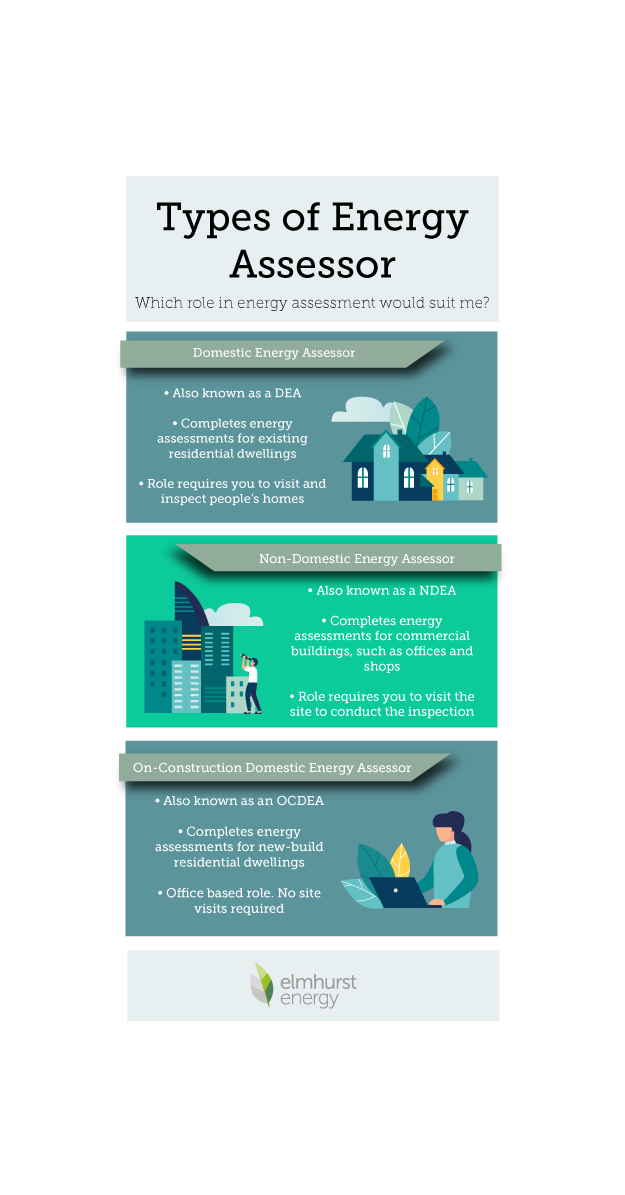I want to change career - is working in energy assessment right for me?
Do you often find yourself thinking about pursuing a new career? Maybe you’re interested in a career in sustainability where you can make a real difference? If that sounds like you, why not consider a career in energy assessment?
What does an energy assessor do?
An energy assessor specialises in providing energy assessments for a particular type of building: either residential (domestic) buildings, commercial (non-domestic) buildings, or new build properties. Energy assessors are required to follow a standardised procedure when conducting energy assessments, and Elmhurst Energy provides the necessary training, software, accreditation scheme, and support team for assessors to successfully complete and lodge EPCs.
What are the different types of energy assessor?
- Domestic Energy Assessor (DEA) – Completes energy assessments on residential/domestic dwellings. This is a role where you will be required to visit people’s homes, inspect the inside/outside of them, and input the relevant measurements and calculations into Elmhurst approved software.
- Non-Domestic Energy Assessor (NDEA) – Completes energy assessments on commercial/non-domestic properties. This role requires you to visit the site of the commercial building in order to complete an assessment.
- On-Construction Domestic Energy Assessor (OCDEA) – Completes energy assessments on new-build residential dwellings. This is more of an office/home based role.
Benefits of working in energy assessment
There are many benefits to becoming an energy assessor, which are outlined below.
Flexible hours
Can be part-time or full-time
Opportunities to supplement your existing income
Working in a growing industry
Flexible hours
When you’re self-employed and working as an assessor, you have a lot of control over your working days. This includes: how often you work, what time you work during the day(s), and what kind of work you want to take on. For example, if you have commitments every Thursday, you can simply ensure that you don’t book any assessments for that day.
However, there is also the option to be employed by a company. An advantage of this is that it may be easier to find work as you won’t have to search for customers like you would if you were self-employed.
Full-time/part-time career opportunities
As mentioned earlier, being an energy assessor allows you to control what kind of job role you want to pursue – whether it be a full-time role or a part-time role. This job allows you to dictate how much work you want to take on each week, and can vary over time, depending on how many assessments you want to take on.
Opportunities to supplement your existing income
If you’re not completely sure that you want to change career and switch to a new industry, you could always train up as an assessor and use it as a way to earn some extra money. It provides a great opportunity to test it out before fully committing.
Working in a growing industry
Do you want a job which contributes to helping the environment? The energy efficiency industry and EPCs are all about measuring the energy performance of UK homes and buildings, which includes recommending steps to improve them. This all contributes towards the nation’s goal of reducing carbon emissions and our impact on climate change. If you want to feel like you’re making a difference and helping out, maybe a job as an energy assessor is right for you?
Another advantage of working in this industry is that there is an increasing demand for energy professionals, as current regulations state that all properties in the UK must have a valid EPC before being sold or let. Moreover, as the UK strives to meet its goal of net zero carbon by 2050, energy professionals will have an increasingly important role to play in helping homeowners and business owners to reduce the amount of emissions they produce.

How can I become an energy assessor?
Depending on which route of energy assessment you wish to pursue, you must undertake a relevant training course. For more information regarding training, click on the relevant link below.
Domestic Energy Assessor: https://www.elmhurstenergy.co.uk/training/domestic-energy-assessor-dea-training
Non-Domestic Energy Assessor: https://www.elmhurstenergy.co.uk/accreditation/non-domestic-energy-assessor
On Construction Domestic Energy Assessor: https://www.elmhurstenergy.co.uk/accreditation/on-construction
